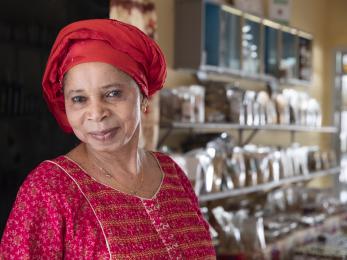Unveiling a world of possibility on India’s tea estates
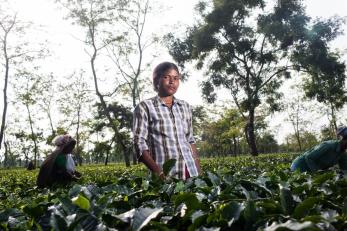
With the rolling hillsides behind her, Jyolita weaves through rows of waist-high tea plants, carefully plucking the leaves and stowing them in a large woven basket stretching the length of her back. In a factory nearby, Protima sorts the good leaves from the rotten ones by hand, readying them for the next stage of production.
The tea industry is one of India’s largest employers of women — females make up at least half of its workforce — and for Jyolita and Protima, this is daily life. It’s just after dawn on a tea estate in Assam, India, and their meticulous work will continue for the next eight hours as they work to support themselves and their families.
Despite India’s sweeping economic gains and advances in development over the past 70 years — literacy rates have quadrupled and life expectancy has more than doubled — 400 million of its citizens still live in poverty, making up one-third of all the world’s poor.
Life on a tea estate in India
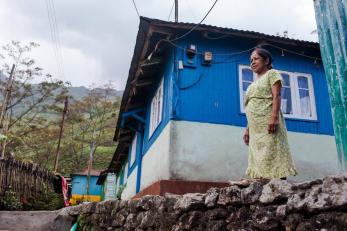
Tea workers, who live, work and raise their families on plantations — like this one in Assam — are geographically isolated and face unique challenges of poor quality education, low connectivity and limited access to resources and services.
And yet, despite the challenging circumstances, it’s uncommon for youth to leave.
Some are unaware of what other opportunities may exist beyond the tea estates. Others may not have access to the resources they need to build new livelihoods or may be hesitant to leave the close-knit family, community and safety net they are part of on the estates.
Lack of educational opportunities, scarce financial resources, and limited exposure to life outside the estate makes it difficult for young people to envision anything different than what they were born into, let alone strike out on their own.
This is why Mercy Corps’ work is so critical. With the support of The Starbucks Foundation, Mercy Corps has been working with local partners and estate managers for over a decade to change the status quo.
Together, we are working to improve living conditions, create economic opportunities and empower tea workers to improve their circumstances, with a special focus on women and youth. Because we believe with the right support, a better and brighter future is possible.
Creating new entrepreneurial opportunities
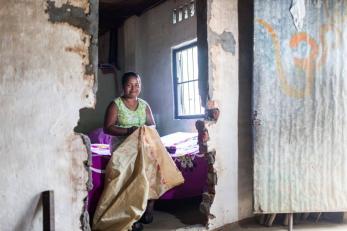
Only 30 percent of students in Assam finish their final year of secondary school. Madhuri, 22, isn’t one of them.
Like many of her peers, Madhuri dropped out early. The low quality of classes, the far distance to upper-level courses, and the cost of attending can keep students here from finishing their studies.
For Madhuri, her family did not have enough money for her books and supplies.
Without classes to attend, Madhuri spent idle days in her home. It wasn’t until getting involved in Mercy Corps’ vocational training program that she began to see what options she had for her future. Through our local partner, Madhuri learned tailoring and received a sewing machine to start making clothing, which she now sells from her home.
“I never realized there was this business opportunity right here in my village,” Madhuri says. “I work at home and earn handsome money to support myself and my family.”
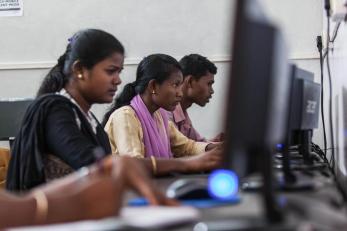
Protima, 22, worked in a tea factory sorting leaves after father died five years ago — her mother couldn’t afford to send her for more schooling even though she had a dream of studying computer science.
Protima was losing hope in her options when she received the chance to learn Tally, an accounting program, through Mercy Corps. Because participants of vocational training like this are also connected to jobs and apprenticeships, Protima now believes she has an opportunity to improve her family’s life. Her goal is to get a well-paying position that will help support her family.
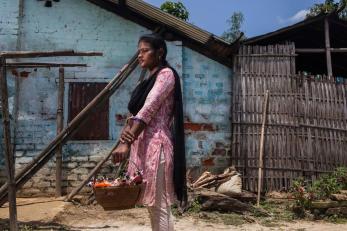
20-year-old Jyolita’s family doesn’t want her to leave the tea estate, limiting her options to advance her education or earn an income.
The traditional doll making training Mercy Corps’ local partner provides is ideal for youth like her, who want or need to stay on the estate. Jyolita recently learned how she could participate in the doll making trade, receiving business knowledge and a chance to generate her own income, all without having to leave home.
The endeavor has made Jyolita happier and prouder of the way she spends her time, and because she has laid the foundation to start her own business, it has given her access to something that once felt out of reach: control of her future.
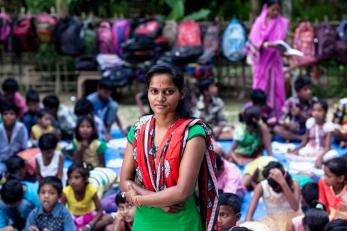
Manjula, 24, formerly sorted tea in a factory but wanted to do more. She jumped at the chance to become a teacher through Mercy Corps’ pre-primary and nursery school teacher training.
Manjula experienced the failings of the school system growing up herself, not learning to read or write until later in her education. The teacher training offered her an alternate livelihood and the chance to ensure young students receive the educational support she didn’t when she was younger.
Since completing the training, Manjula has started an after-school at her home, hosting up to 120 students every day and using the time to help them learn basic skills, build confidence and develop a desire to succeed.
Committed to long-term impact
These stories represent just a few of the individuals who are being connected with the tools, support and resources they need to realize a brighter future for themselves and their families.
For 13 years, The Starbucks Foundation and Mercy Corps have been working to improve the quality of life for tea and cardamom-producing communities in Assam and Darjeeling, India, and Alta Verapaz, Guatemala.
Learn how this work is changing lives in Guatemala ▸
Together, we are working to provide vocational training for youth, increasing access to water and health services, and creating economic opportunity and alternative livelihoods for tea farmers and their families. Our long-standing partnership and commitment is showing positive results — to date we have reached over 123,000 people in India and Guatemala, and we aspire to reach many more.


